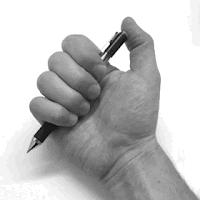Misophonia - ever heard of it?
According to Harvard Health, people who experience Misophonia have negative emotional reactions to everyday sounds, such as chewing. Most often, the trigger sounds are mouth noises such as coughing, throat clearing, and of course chewing. This condition typically doesn't manifest until adolescence.
This phenomenon is still relatively unknown to many, including doctors, but brain scans show that people who suffer from Misophonia actually react differently physiologically. Phillip Gander explains on the NPR podcast that much more research must be done in order for us to learn more about this condition. Doctors do not currently know what causes it. The Misophonia Association was formed in 2013 with the goals of Education, Advocacy, Research, and Support. They hold an annual convention in an attempt to achieve these goals.
As we learn about Misophonia, more and more people are talking about it. Sarah Silverman discussed living with it in her interview with Dax Shepard on his podcast, Armchair Expert. She explains that she typically only experiences a negative reaction when she already feels stressed, but it can be brought on by any number of sounds, including gum chewing, apple eating, pen clicking, and food wrapper crinkling. She describes her experience as her brain as becoming "paralyzed" and overcome with rage, and even tells of her experience having a "full blown panic attack" watching the movie "The Shape of Water" where a character regularly eats hard candies. She feels certain that her dad also had the same condition, which is something I can relate to.
My dad has always been easily bothered by noises, and over time, I've noticed the same characteristic in myself. According to my 23andMe results, I have "slightly higher than average" odds of experiencing Misophonia, but I didn't need this test to tell me that. When I hear clicking, tapping, or other repetitive sounds, my brain focuses in on them. I would never describe my reaction as "rage" or "panic," but I do lose all ability to focus on whatever task I should be paying attention to (a friend talking, reading a book, etc.) and can't return my attention until the noise has been stopped. As you may imagine, this can be difficult to manage in a classroom full of students. Having Misophonia means not being afraid to politely ask that someone stop doing some mindless task quite so loudly, but I can always take refuge in knowing that there is probably at least one other person who is glad I asked.
 |
| Image Source |
This phenomenon is still relatively unknown to many, including doctors, but brain scans show that people who suffer from Misophonia actually react differently physiologically. Phillip Gander explains on the NPR podcast that much more research must be done in order for us to learn more about this condition. Doctors do not currently know what causes it. The Misophonia Association was formed in 2013 with the goals of Education, Advocacy, Research, and Support. They hold an annual convention in an attempt to achieve these goals.
As we learn about Misophonia, more and more people are talking about it. Sarah Silverman discussed living with it in her interview with Dax Shepard on his podcast, Armchair Expert. She explains that she typically only experiences a negative reaction when she already feels stressed, but it can be brought on by any number of sounds, including gum chewing, apple eating, pen clicking, and food wrapper crinkling. She describes her experience as her brain as becoming "paralyzed" and overcome with rage, and even tells of her experience having a "full blown panic attack" watching the movie "The Shape of Water" where a character regularly eats hard candies. She feels certain that her dad also had the same condition, which is something I can relate to.
My dad has always been easily bothered by noises, and over time, I've noticed the same characteristic in myself. According to my 23andMe results, I have "slightly higher than average" odds of experiencing Misophonia, but I didn't need this test to tell me that. When I hear clicking, tapping, or other repetitive sounds, my brain focuses in on them. I would never describe my reaction as "rage" or "panic," but I do lose all ability to focus on whatever task I should be paying attention to (a friend talking, reading a book, etc.) and can't return my attention until the noise has been stopped. As you may imagine, this can be difficult to manage in a classroom full of students. Having Misophonia means not being afraid to politely ask that someone stop doing some mindless task quite so loudly, but I can always take refuge in knowing that there is probably at least one other person who is glad I asked.
| Image Source |
You can learn more about Misophonia on WebMD or any of the resources linked above.

Comments
Post a Comment